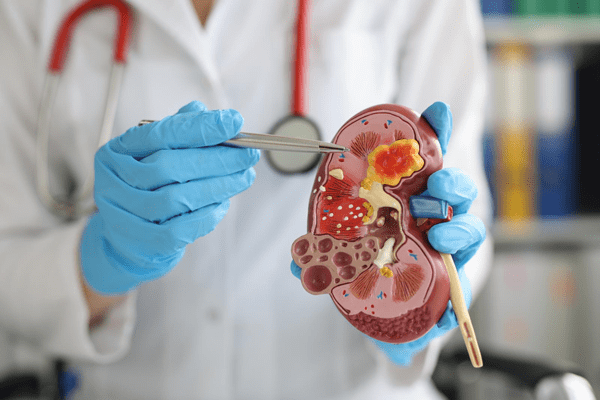Kidneys are vital organs that play a crucial role in filtering toxins from our bodies. When kidneys don’t function properly, it can lead to a buildup of toxins, causing significant health issues. Shockingly, more than 37 million Americans suffer from kidney disease, with only a small percentage aware of their condition. Early signs of kidney disease often go unnoticed or are attributed to other conditions, making it essential to be vigilant. In this article, we will explore the ten signs that your kidneys need help and discuss nine effective ways to prevent kidney disease.

Fatigue – A Warning Sign of Kidney Dysfunction
Kidneys act as filters for toxins in our bodies. When they fail to function optimally, impurities can accumulate in the blood, leading to fatigue, weakness, dizziness, and difficulty focusing. Healthy kidneys also produce erythropoietin, a hormone responsible for red blood cell production. Reduced red blood cells can result in fatigue and frailty, often associated with anemia.
Headline 2: Feeling Cold in a Warm Room – An Indicator of Kidney Disease
Kidney disease can cause anemia, which may make you feel unusually cold even in warm environments. This symptom often goes unnoticed or is mistakenly attributed to external factors. It’s crucial to get your kidneys checked if you frequently experience chills in warm surroundings.
Shortness of Breath – A Surprising Kidney Disease Symptom
While shortness of breath is typically linked to heart or lung problems, it can also be caused by kidney disease. Accumulation of excess fluids and toxins in the lungs due to impaired kidney function can lead to breathlessness. Additionally, anemia resulting from kidney disease can deprive the body of oxygen, making even mild physical exertion challenging.
Dry and Itchy Skin – A Skin Manifestation of Kidney Dysfunction
In addition to filtering toxins and producing red blood cells, kidneys help maintain the body’s mineral balance, which impacts the health of our skin. Dry and itchy skin can be a telltale sign of failing kidneys, as they struggle to regulate mineral levels. Moreover, the accumulation of toxins in the bloodstream can cause various skin reactions, emphasizing the importance of not ignoring these symptoms.
Swollen Ankles, Feet, or Hands – Fluid Retention and Kidney Disease
Impaired kidney function can lead to fluid retention and sodium accumulation in the body. This often manifests as swelling in the extremities, such as the ankles, feet, or hands. However, it’s essential to note that swollen extremities can also be a sign of other underlying conditions, such as liver, heart, or chronic vein diseases.
Puffiness Around the Eyes – A Distinctive Kidney Disease Symptom
When kidneys are damaged and allow protein to leak into the urine, it can cause puffiness around the eyes and face. This, along with swelling in other parts of the body, indicates potential kidney problems. It’s advisable to consult a doctor to determine the underlying cause of these symptoms, as they can sometimes signal other disorders.
Bad Breath and Metal Taste – Unpleasant Side Effects of Kidney Disease
People with kidney disease often complain of a persistent metallic taste in their mouths and bad breath. Uremia, a condition resulting from an accumulation of toxins in the blood, can cause these symptoms. Uremia can also lead to nausea, vomiting, and loss of appetite. Seeking medical attention promptly is crucial at this stage.
Urination Issues – A Red Flag for Kidney Problems
Kidneys play a significant role in urine production. Frequent urination accompanied by pain or burning sensations may indicate a kidney problem. Decreased urine output or frequently waking up at night to urinate can also be signs of kidney dysfunction. These symptoms should not be ignored, and it’s advisable to consult a doctor promptly.
Foamy or Bloody Urine – Alarming Indications of Kidney Issues
Foamy urine can indicate a significant amount of protein in the urine, a condition known as proteinuria. This foam resembles the appearance of scrambled eggs due to the presence of albumin. Bloody urine, on the other hand, can be a sign of kidney infections, tumors, stones, or kidney failure. Ignoring these symptoms can have serious consequences, and medical attention is essential.
Trouble Sleeping – Kidney Dysfunction and Sleep Disorders
When kidneys fail to filter toxins effectively, they remain in the bloodstream, disrupting the body’s balance. This can make it difficult to sleep and lead to sleep apnea, a sleep disorder characterized by interrupted breathing during sleep. Sleep apnea is common in individuals with chronic kidney disease.
Conclusion
Understanding the signs that indicate your kidneys need help is crucial for early detection and prevention of kidney disease. By recognizing symptoms such as fatigue, coldness, shortness of breath, skin issues, swelling, puffiness, bad breath, urination problems, abnormal urine, and sleep disturbances, you can seek appropriate medical attention. Additionally, adopting preventive measures is essential. Stay hydrated, use medications cautiously, engage in regular exercise, follow a healthy diet, be mindful of antibiotics, maintain blood sugar levels, limit supplements, and avoid smoking and excessive alcohol consumption. Regular kidney function tests are also recommended, particularly if you’re at risk due to age, family history, or pre-existing conditions. By prioritizing your kidney health, you can take charge of your overall well-being and lead a healthier life.
